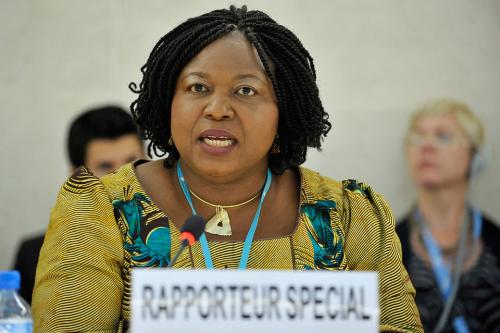Commending UAE efforts against human trafficking, UN expert urges more to help victims
A United Nations independent human rights expert today urged the United Arab Emirates’ (UAE) authorities – at Federal and Emirate level – to further concentrate on the plight of the victims of trafficking, while keeping up their fight against human trafficking.

Special Rapporteur Joy Ngozi Ezeilo.
“The UAE must be commended for its strong commitment to combat trafficking in persons both at the domestic level and in the Gulf region,” the UN Special Rapporteur on trafficking in persons, especially women and children, Joy Ngozi Ezeilo, said in a press release, at the end of her first visit to the country. “However it needs to devote greater attention to identification of countless victims of all forms of trafficking and guarantee their right to effective remedy.”
Noting that foreign workers make up more than 170 different nationalities in the UAE, Ms. Ezeilo said that over her seven-day visit she met with victims trafficked from around the world “which makes the uniqueness of the challenges faced by this country in combating this phenomenon.”
“I also found that the most common forms of trafficking in the UAE are prevalent in sex trade and domestic work for women, and children in some cases, while for men, it is in the labour industry,” she added.
According to the Office of the High Commissioner for Human Rights (OHCHR), this situation has led to the creation of a lucrative market for criminal involvement in the market of foreign workers, increasing their vulnerability to trafficking.
For the Special Rapporteur, one of the major tasks ahead will be to reduce that vulnerability to human trafficking by means of safe and legal migration arrangements, in order to ensure that the high demand for cheap, low-skilled or semi-skilled foreign labour is not exploited by traffickers and agents.
“I urge the Government to expand the definition of trafficking, to explicitly include labour exploitation, domestic servitude as well as other forms of trafficking such as forced and servile marriages,” Ms. Ezeilo said. “Despite official efforts to sensitizing law enforcement officers on the issue of human trafficking, the identification of victims, especially domestic workers trafficked for labour exploitation still remains non-existent and problematic.”
The independent expert also drew attention to the lack of comprehensive statistical information on prevalence rate, forms, trends and manifestation of human trafficking in the UAE. Attention has being focused almost exclusively on trafficking for sexual exploitation, making other forms of trafficking practically invisible and unrecognized by the general population, the authorities and the victims themselves.
Even though current federal law penalizes human trafficking, Ms. Ezeilo also noted, it does not include any provision for victims’ protection, assistance, recovery, rehabilitation or on their right to compensation.
During her visit, the Special Rapporteur visited Abu Dhabi, Dubai and Sharjah, where she met with Federal and Emirate level government officials from the Ministries of Foreign Affairs, Labour, Interior, Justice, Social Affairs, and various other departments and agencies, including the National Committee to Combat Human Trafficking, the Judicial Department, Public Prosecution and the Police.
She also met with victims of trafficking, including foreign workers at labour camps, and visited shelters set up for women and children victims.
Independent experts, or special rapporteurs, are appointed by the Geneva-based Human Rights Council to examine and report back on a country situation or a specific human rights theme. The positions are honorary and the experts are not United Nations staff, nor are they paid for their work. Ms. Ezeilo will present a comprehensive report with her findings and recommendations to the Council in June 2013.
Source: UN NEWS
- 572 reads
Human Rights
Ringing FOWPAL’s Peace Bell for the World:Nobel Peace Prize Laureates’ Visions and Actions

Protecting the World’s Cultural Diversity for a Sustainable Future

The Peace Bell Resonates at the 27th Eurasian Economic Summit

Declaration of World Day of the Power of Hope Endorsed by People in 158 Nations

Puppet Show I International Friendship Day 2020

